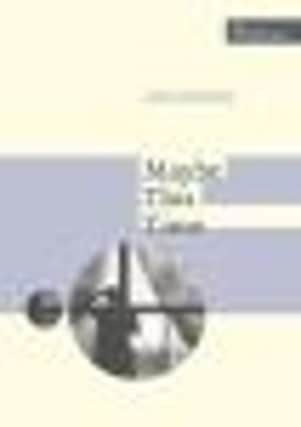Book review: Maybe This Time by Alois Hotschnig (translated by Tess Lewis)


But Alois Hotschnig’s mesmerising collection of stories probing loss of identity becomes a terrifying transit into alienation, obsession and even madness.
Disturbing, haunting and compulsive, these brief forays into the human mind speak volumes about modern society ... its pressures, its cruel impersonality and its sometimes poisonous love affair with the self.
Advertisement
Hide AdAdvertisement
Hide AdHotschnig is the third author in the impressive Year of the Man series from Peirene Press, a vibrant publisher dedicated to bringing European literature to English readers and which here uses the smooth talents of translator Tess Lewis.
Peirene’s speciality is short books featuring the most incisive, inventive and thought-provoking ideas that spring from the pens of our Continental cousins.
Hotschnig is one of Austria’s most critically acclaimed authors, eliciting comparison with Franz Kafka and Thomas Bernhard. He has written novels, short stories and plays and his books have won major Austrian and international honours.
From a loner who stalks his neighbours and a family gathering blighted by a single, missing relative to the chilling tale of man lured to a woman’s house where he finds a doll resembling himself, Maybe This Time is a series of startling mind games which constantly toy with our sense of reality and nightmare.
Advertisement
Hide AdAdvertisement
Hide AdThe search for purpose and identity is oblique, contradictory and increasingly dramatic as the range of narrative voices move from barely recognisable normality into troubling abnormality.
One character’s simple act of observing his close neighbours at their lakeside home becomes obsessive because ultimately he is stalking himself. ‘I no longer had a life of my own,’ he notes, ‘but lived through them.’
Their rejection of him only increases the desire to absorb their lives into the empty space in his own. ‘Rejection, after all, is a kind of contact.’
In another story, a man’s distorted perspective becomes so severe that he moves around disguised, isolated from those around him, until he finds himself becoming ‘whoever they wanted to see in him.’
Advertisement
Hide AdAdvertisement
Hide AdPerhaps the most spine-tingling tale is the account of the man who confronts the strange doll made in his own image and through which he sees himself ‘in a way he had never done before.’
‘I stood behind or followed myself, distant, impartial, devoid of emotion, and what I saw was both familiar, but then again not.’
Throughout these provocative stories, the cast of insubstantial players drift like lost souls tantalisingly and sometimes menacingly trapped in a dangerous vacuum created by their own destructive thought processes.
‘There is nothing either good or bad, but thinking makes it so,’ said Shakespeare’s Hamlet...
Advertisement
Hide AdAdvertisement
Hide AdIntriguing and powerful, Maybe This Time perfectly captures the sense of abandonment, the unpalatable truths, the trickery and the nihilism that have driven our desperate bid to find both a sense of identity and a firm footing in the bewildering and uncharted waters of the 21st century.
(Peirene Press, paperback, £8.99)